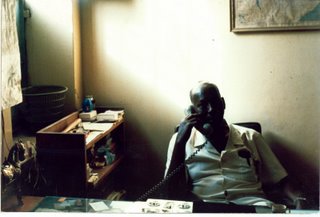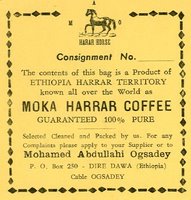Tuesday, March 21, 2006
El Salvador...Again, what the heck is a pulped natural?

Last week Jeri Idso and I went for a quick visit to El Salvador. The harvest is winding down, most of the cherries are off the trees, beans are resting in parchment and shipments are going out daily. The coffee has rested for a while and much more high altitude coffee is now in the mix, so it cups a lot better than samples I cupped in mid- January.
In order to understand what a pulped natural is, and why you might want to buy one, you need to think about the ways coffee is processed. So first let us review: under the skin of a coffee cherry is a layer of mucilage, a sticky sweet fruit. Under this stuff is the parchment or pergamino, and under the parchment is the coffee bean.
After the ripe cherries are picked there are four different ways to proceed with the processing, and each creates a different taste profile (not counting what goes on in Sumatra which I trust you’ll appreciate we not discuss at this time). There are many slight variations, but the four main processes are:
1. De-mucilage Process—strip off the mucilage immediately and dry the parchment. Very common in Costa Rica and Colombia
2. Fermented and fully washed Process--- put the de-pulped cherries into a tank and let the mucilage dissolve, then wash and dry the parchment. A very traditional and common process utilized by most fine mild coffee producers such as Guatemala, Kenya and Panama, to name but a few.
3. Naturals---dry the cherries with the skin still on. Ripe cherry is simple dried. The cherry dehydrates and becomes woody and hard. Before the coffee is exported, the dried cherry and parchment are milled off the bean. This is, for example, the way Yemen and Ethiopian Harrar are processed.
4. Pulped Natural---to create a pulped natural, you do something in between the washed and natural processes. First, the cherry skin is removed as in the washed process, but then what remains, sticky fruit and all, goes directly to the drying patio and is dried with a great deal of attention. Constant raking and turning of the sticky wet parchment is critical. If the coffee is not turned and dried just right, very bad things can happen.
I am told by JASAL in El Salvador that they have the secret for making great pulped naturals… and that secret is… location, location, location.
At the Las Cruces mill in El Salvador, JASAL has what they believe are unique and ideal conditions: constant breezes, full sunshine during the day, and relatively cool, dry nights. About three years ago JASAL started experimenting with the pulped natural process. They’ve sent samples to us, and we cupped coffee there, usually not aware of how the coffee was processed. In blind cupping, we kept picking out the pulped natural among our favorites.
The truth is we don’t really care how coffee is processed---we’re looking for the best cupping coffees. That being said, I think we have tried enough of these pulped natural coffees to be able to highly recommend them. They become bigger, fuller, more flavorful, a bit more fruit, and yet they don’t lose acidity. Many coffee people try them and think about making great espresso..so do we.
We have a great line up of coffees from El Salvador. Check out the offering list. A personal tip….the Cerro las Ranas SHB for the second half of the year...Come this October it should be as good a Central American coffee as can be found.
---Robert Fulmer
Friday, March 10, 2006
IN MEMORY OF THE KING
 “A good name is far better than a good deal of money” –m.a.ogsadey
“A good name is far better than a good deal of money” –m.a.ogsadey
The coffee business has lost a king. In early February, Mohamed Abdullahi Ogsadey was killed in a car accident in Ethiopia. A Somali king by birth, he immigrated to Ethiopia and has been our supplier of Ethiopian coffees since the early1980’s. We shall not soon see his like again.
A devout Muslim, Ogsadey never drank alcohol, never ate pork, and never (!) drank coffee…except for once at my house, when I brought out my mother’s antique Turkish espresso cups, and he graciously deigned to take a few sips. He walked the earth like the true king he was, eagerly followed by gleeful children, hoping for the generous handouts he was known for. One of our customers once found himself on a bus with Ogsadey, who bought Qat for the entire bus to chew on for the duration of the trip. In a business of sharks, he was the epitome of honor. In all our years of dealing with him, his knowledge and understanding of the coffee business never failed to impress us, never once fell below the very highest standards of the industry. His reputation at the time of his unexpected death was impeccable.
Words cannot convey his demeanor and stature. His son Saad once said to me, “all of his sons have been to University, but none of us can hold a candle to him.” No one who ever met him would ever forget him. Tall, handsome, smiling, he dominated a room.
In the end, we will always hold him in our hearts, but he will remain with us also as a symbol of what is best in the industry. He was an honorable man, who never cheated in business, and gave back to those at the bottom of the coffee chain who need it the most. We would all do well to enjoy his reputation when our time comes…..
-Helen Nicholas
 “A good name is far better than a good deal of money” –m.a.ogsadey
“A good name is far better than a good deal of money” –m.a.ogsadeyThe coffee business has lost a king. In early February, Mohamed Abdullahi Ogsadey was killed in a car accident in Ethiopia. A Somali king by birth, he immigrated to Ethiopia and has been our supplier of Ethiopian coffees since the early1980’s. We shall not soon see his like again.
A devout Muslim, Ogsadey never drank alcohol, never ate pork, and never (!) drank coffee…except for once at my house, when I brought out my mother’s antique Turkish espresso cups, and he graciously deigned to take a few sips. He walked the earth like the true king he was, eagerly followed by gleeful children, hoping for the generous handouts he was known for. One of our customers once found himself on a bus with Ogsadey, who bought Qat for the entire bus to chew on for the duration of the trip. In a business of sharks, he was the epitome of honor. In all our years of dealing with him, his knowledge and understanding of the coffee business never failed to impress us, never once fell below the very highest standards of the industry. His reputation at the time of his unexpected death was impeccable.
Words cannot convey his demeanor and stature. His son Saad once said to me, “all of his sons have been to University, but none of us can hold a candle to him.” No one who ever met him would ever forget him. Tall, handsome, smiling, he dominated a room.
In the end, we will always hold him in our hearts, but he will remain with us also as a symbol of what is best in the industry. He was an honorable man, who never cheated in business, and gave back to those at the bottom of the coffee chain who need it the most. We would all do well to enjoy his reputation when our time comes…..
-Helen Nicholas
Harrar Horse
 If you think the Harrar Horse logo is popular here, you should see what it means in Ethiopia. Ogsadey’s reputation is legendary: first beginning as a truck driver, then becoming the first native African coffee exporter in Ethiopia, and ultimately, building a coffee empire which is famous throughout the county and the world. I’m not exaggerating. As soon as the horse logo and the driver of the company jeep were identified, entire villages would swarm chanting: OG-SA-DEY!-OG-SA-DEY! One might think that kind of adulation could affect one’s ego. I never saw that. Everyone was treated seriously and with respect, as if they were the biggest buyers in the world.
If you think the Harrar Horse logo is popular here, you should see what it means in Ethiopia. Ogsadey’s reputation is legendary: first beginning as a truck driver, then becoming the first native African coffee exporter in Ethiopia, and ultimately, building a coffee empire which is famous throughout the county and the world. I’m not exaggerating. As soon as the horse logo and the driver of the company jeep were identified, entire villages would swarm chanting: OG-SA-DEY!-OG-SA-DEY! One might think that kind of adulation could affect one’s ego. I never saw that. Everyone was treated seriously and with respect, as if they were the biggest buyers in the world.He once drove me to a place in the Harrar growing region three hours from his home in Dire Dawa. While listening to recorded prayers from the Koran on the tape player, Ogsadey told me a story of how, in the good old days, getting to this same place would take two to three weeks, and require winches, machetes and guns to ward off pirates, and in my imagination, big hungry animals.
He worked tirelessly to the end. In his eighties, retirement never occurred to him. Just a few years ago he invested in two big new warehouses. Hundreds of big rigs with the Harrar Horse logo are on the road. He took pride pointing out any new factories or new neon lights in Addis Ababa. He possessed a patriotic pride in his county; despite its poverty, he was ever optimistic. Perhaps a contradiction, he greatly admired both Presidents Reagan and Clinton. Reagan for bringing down that wall, and Clinton, for his tireless statesmanship and efforts to bring peace to the world, particularly in the Middle East. When the Communists took power in Ethiopia, they seized all of Ogsadey’s assets. With a big smile he would tell the story of how they could not figure out how to run the coffee business, so wisely, they gave it all back.
Never, despite frost, droughts, up markets or down markets, did we ever have concern about our contracts with MAO. Doing business was a pleasure. Straightforward, old-fashioned and old school in the most positive sense--- the words honorable and integrity come to mind. He was a tremendous mentor and influence. Together, we had the opportunity, with the help of our customers, to make some significant donations to the Dil Chora Hospital in Dire Dawa. Royal will continue charitable work in Ethiopia as long as we are in business. In this way we will continue to honor our great friend. May he rest in peace.
-Robert Fulmer
